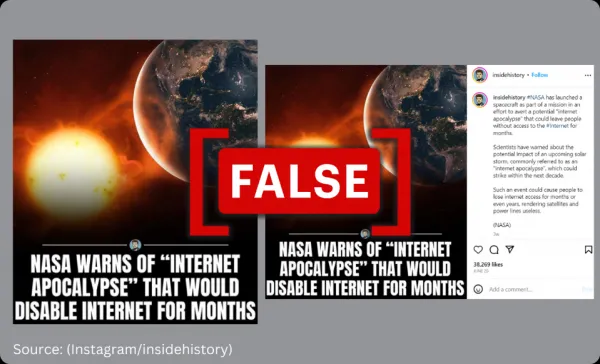By: Umme Kulsum
July 13 2023

NASA has not issued an official warning about internet outages or referred to any possible "internet apocalypse" in 2025.
Context
An Instagram post claims, "NASA has launched a spacecraft as part of a mission to avert a potential "internet apocalypse" that could leave people without access to the #Internet for months." The post says, “Scientists have warned about the potential impact of an upcoming solar storm, commonly referred to as an "internet apocalypse", which could strike within the next decade. Such an event could cause people to lose internet access for months or even years, rendering satellites and power lines useless [sic].” The Instagram post has gained 38,212 likes and more than 4,000 comments. An archive of the post can be found here.
Speculation over an "internet apocalypse" has been linked to NASA's Parker Solar Probe (PSP) mission, which was launched in 2018. The probe was developed to better understand the sun and to expand the knowledge of the origin and evolution of solar winds.
In Fact
Logically Facts conducted extensive research and found no evidence that NASA officially issued any such warning. NASA has not used the term "internet apocalypse" in any of its online material on the Parker Solar Probe. The PSP was sent to space in August 2018 to study the sun and is not a recent mission to “avert a potential internet apocalypse.”
The only mention of an “internet apocalypse" by NASA is in a report published in April 2022 about the “High Energy Astrophysics Science Archive Research Center” (HEASARC), which sent out a satellite called the Reuven Ramaty High Energy Solar Spectroscopic Imager (RRHESI). This satellite was sent to space in 2002 to study solar flares. The page explains the power of solar flares, which are defined as the “sudden release of large amounts of electromagnetic energy from the solar magnetic field.” The website says these flares could do “serious harm to our electronically-dependent communications networks, perhaps even causing an 'internet apocalypse,' lasting days, weeks, or even longer.”
Technologies on Earth are susceptible to the extremes of space weather. Powerful electrical currents could disrupt electric power networks, and GPS navigation and high-frequency radio communications might also be affected by ionosphere changes brought on by geomagnetic solar storms.
But will this happen in July 2025, as widely reported?
Space.com reports that there are “no science-backed predictions that a deadly solar storm will occur in 2025.”
Every 11 years, the sun's magnetic field changes, a process called the solar cycle. The solar cycle has a 'minimum' phase and a 'maximum' phase, in which more solar flares are reported. According to NASA, the 'maximum' phase is scheduled to begin in 2025.
Dr. Alexa Halford, a NASA scientist from the Goddard Space Flight Centre and a member of the NASA Space Weather Council, told Logically Facts, "The coming solar [maximum] will not create an apocalypse or collapse of the internet."
"There are some impacts that solar storms can have on long wires, satellites, and other technologies, but it is highly unlikely that all of our technologies and engineering protections that have been put in place would fail," Dr. Halford said.
Halford added that when solar storms impact the Earth, they can cause an increase in currents along long wires or pipelines. This was seen during the 1989 blackout, but that was likely "a one-in-a-hundred-year storm," Halford said. "We have better policies and practices and more resilient hardware now in place to work to ensure that we don't have another blackout like that. Similar precautions and redundances have been developed for other industries impacted by space weather, including the internet."
The Verdict
NASA has not made any official announcement about an "internet apocalypse" in 2025. Social media posts and reports warning about an "internet apocalypse" caused by a solar storm are speculative and lack scientific basis. Therefore, we have marked this claim as false.